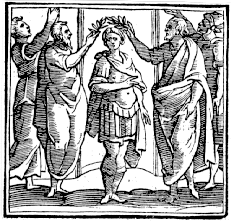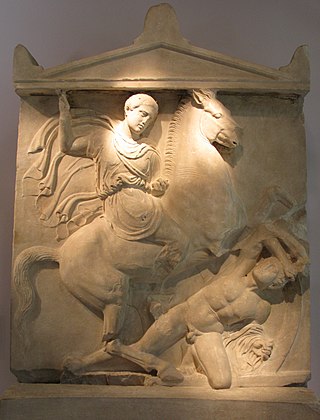
The 4th century BCE started the first day of 400 BCE and ended the last day of 301 BCE. It is considered part of the Classical era, epoch, or historical period.

This article concerns the 200 BC decade, that lasted from 209 BC to 200 BC.
This article concerns the period 469 BC – 460 BC.

This article concerns the period 409 BC – 400 BC.
This article concerns the period 399 BC – 390 BC.
This article concerns the period 389 BC – 380 BC.
This article concerns the period 279 BC – 270 BC.

Lysander was a Spartan military and political leader. He destroyed the Athenian fleet at the Battle of Aegospotami in 405 BC, forcing Athens to capitulate and bringing the Peloponnesian War to an end. He then played a key role in Sparta's domination of Greece for the next decade until his death at the Battle of Haliartus.
Year 403 BC was a year of the pre-Julian Roman calendar. At the time, it was known as the Year of the Tribunate of Mamercinus, Varus, Potitus, Iullus, Crassus and Fusus. The denomination 403 BC for this year has been used since the early medieval period, when the Anno Domini calendar era became the prevalent method in Europe for naming years.

Thrasybulus was an Athenian general and democratic leader. In 411 BC, in the wake of an oligarchic coup at Athens, the pro-democracy sailors at Samos elected him as a general, making him a primary leader of the ultimately successful democratic resistance to the coup. As general, he was responsible for recalling the controversial nobleman Alcibiades from exile, and the two worked together extensively over the next several years. In 411 and 410, Thrasybulus was in command along with Alcibiades and others at several critical Athenian naval victories.
Year 280 BC was a year of the pre-Julian Roman calendar. At the time it was known as the Year of the Consulship of Laevinus and Coruncanius. The denomination 280 BC for this year has been used since the early medieval period, when the Anno Domini calendar era became the prevalent method in Europe for naming years.
Spartan hegemony refers to the period of dominance by Sparta in Greek affairs from 404 to 371 BC. Even before this period the polis of Sparta was the greatest military land power of classical Greek antiquity and governed, dominated or influenced the entire Peloponnese. The defeat of the Athenians and the Delian League in the Peloponnesian War in 431–404 BC resulted in a short-lived Spartan dominance of the southern Greek world from 404 to 371 BC. Due to their mistrust of others, Spartans discouraged the creation of records about their internal affairs. The only histories of Sparta are from the writings of Xenophon, Thucydides, Herodotus and Plutarch, none of whom were Spartans. Plutarch was writing several centuries after the period of Spartan hegemony had ceased. This creates difficulties in understanding the Spartan political system, which was distinctly different from any other Greek polis.

The Corinthian War was a conflict in ancient Greece which pitted Sparta against a coalition of city-states comprising Thebes, Athens, Corinth and Argos, backed by the Achaemenid Empire. The war was caused by dissatisfaction with Spartan imperialism in the aftermath of the Peloponnesian War, both from Athens, the defeated side in that conflict, and from Sparta's former allies, Corinth and Thebes, who had not been properly rewarded. Taking advantage of the fact that the Spartan king Agesilaus II was away campaigning in Asia against the Achaemenid Empire, Thebes, Athens, Corinth and Argos forged an alliance in 395 BC with the goal of ending Spartan hegemony over Greece; the allies' war council was located in Corinth, which gave its name to the war. By the end of the conflict, the allies had failed to end Spartan hegemony over Greece, although Sparta was weakened by the war.

Chu was an ancient Chinese state during the Zhou dynasty. Their first ruler was King Wu of Chu in the early 8th century BC. Chu was located in the south of the Zhou heartland and lasted during the Spring and Autumn period. At the end of the Warring States period it was destroyed by the Qin in 223 BC during the Qin's wars of unification.

The Battle of Boju was the decisive battle of the war fought in 506 BC between Wu and Chu, two major kingdoms during the Spring and Autumn period of ancient China. The Wu forces were led by King Helü, his brother Fugai, and Chu exile Wu Zixu. According to Sima Qian's Shiji, Sun Tzu, the author of The Art of War, was a main commander of the Wu army, but he was not mentioned in the Zuo Zhuan and other earlier historical texts. The Chu forces were led by Lingyin Nang Wa and Sima Shen Yin Shu. The Wu were victorious, and captured and destroyed the Chu capital Ying.

Teleutias was the brother of the Spartan king Agesilaus II, and a Spartan naval commander in the Corinthian War. He first saw action in the campaign to regain control of the Corinthian Gulf after the Spartan naval disaster at Cnidus in 394 BC, and was later active in the Spartan campaign against Argos in 391 BC. Later that year, he was dispatched to the Aegean to take command of a Spartan fleet harassing Rhodes. Once in command, he attacked and seized a small Athenian fleet sailing to aid Evagoras I of Salamis, Cyprus, then settled in to attack Rhodes with his newly augmented fleet.

King Zhaoxiang of Qin, also abbreviated as King Zhao of Qin (秦昭王), born Ying Ji (嬴稷), was the king of the Qin state from 306 BC to 251 BC. He was the son of King Huiwen and younger brother of King Wu.

Classical Greece was a period of around 200 years in Ancient Greece, marked by much of the eastern Aegean and northern regions of Greek culture gaining increased autonomy from the Persian Empire; the peak flourishing of democratic Athens; the First and Second Peloponnesian Wars; the Spartan and then Theban hegemonies; and the expansion of Macedonia under Philip II. Much of the early defining mathematics, science, artistic thought, theatre, literature, philosophy, and politics of Western civilization derives from this period of Greek history, which had a powerful influence on the later Roman Empire. Part of the broader era of classical antiquity, the classical Greek era ended after Philip II's unification of most of the Greek world against the common enemy of the Persian Empire, which was conquered within 13 years during the wars of Alexander the Great, Philip's son.

The State of Xu was an independent Huaiyi state of the Chinese Bronze Age that was ruled by the Ying family (嬴) and controlled much of the Huai River valley for at least two centuries. It was centered in northern Jiangsu and Anhui.
King Zhao of Chu was from 515 to 491 BC the king of the State of Chu during the Spring and Autumn period of ancient China. He was born Xiong Zhen (熊珍) and King Zhao was his posthumous title. Documents unearthed in the former state also show his title as King Shao (卲王). King Zhao was the son of King Ping of Chu.












